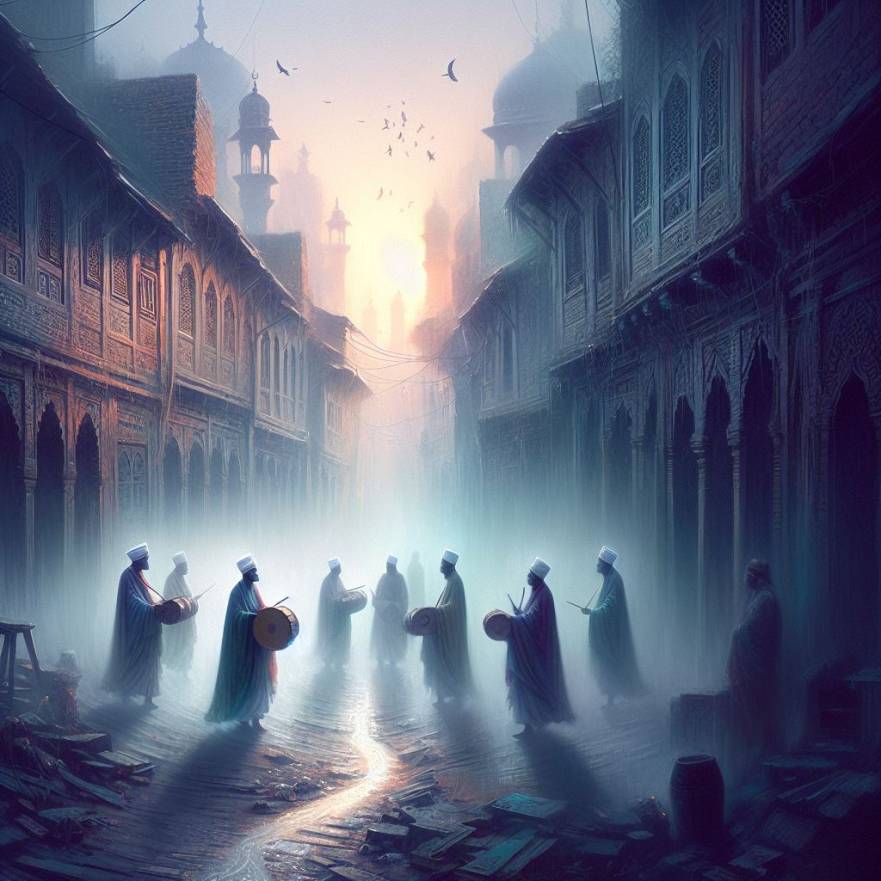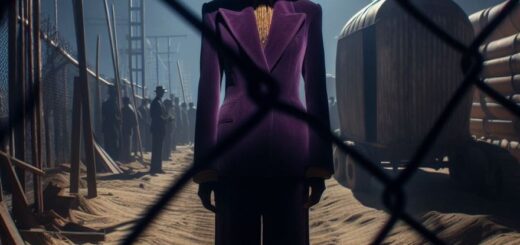A Circle Of Fifths by Mehreen Ahmed

A Circle Of Fifths by Mehreen Ahmed
Pale morning—Qasida singers, walk through the deserted alleys drumming up a traditional song of sehri in old Dhaka, ‘wake up—it’s sehri time. Get going, eat up, fast for Ramadan.’ Rifaat yawns and gets out of bed. She eats an early breakfast. After sehri, a distant tune of the azaan drifts from the minaret of a local mosque. The azaan distances Rifaat; in another era, another place, a spritely young girl named, Safina.
& & &
5:53—a pale morning—Safina wakes up. She can’t wait to be with Raja. Her Raja or King he sure was; gilded he was not. Without a kingdom to rule, or any gold throne to ascend, people throned him in their hearts, even when they mourned. For he was the “People’s King,” which everyone called him. Hence, Safina also called him that, ‘Raja.’ He was king of a kind who supervised spices, silk and trinkets that traversed down the Silk Road to western towns trading ladies’ gowns, amongst other things. No merchant could ever get passed without paying Raja his dues. He called it taxes for the poor, regardless of friends or foes. Come to think of it, he was pretty poor himself; no traces of gold was ever found in his crumbly shack, musty roof, or under his old cracky plank of a floor. Pots and pans had to be pushed under each leak in the roof to catch a drip of many a monsoon.
However, every time Safina saw him, her heart soared, reasons unknown; she simply desired to be in his company; she would be by his side in a leaping lemur stride. While he stood at the checkout point, stopping and taking coins. Merchants made good money, no big deal to give him some of it, not of any consequence. Other regulators also took a cut, on every caravan passing down the track. They pocketed and amassed wealth in no time; no traders along the spice road ever had free pass. Unlike them, Raja continued to live under the shaken roof of his nearly broken den.
“What do you do with all this money?” Safina asked him once.
“Come with me, I’ll take you somewhere.”
It was the smooth month of Ramadan; without anything to eat or drink, they embarked on a journey down the Silk Road, an hour’s horse ride toward the East. They arrived at a mountain range circling a small green lake, a veritable paradise. Adjacent to the lake, Raja and Safina stopped to rest.
“Hungry?” Raja asked.
Safina nodded.
“Go over there and sit by the lake—wait for my return.”
“If I’m crazy enough to come this far with you on an empty stomach, a few short hours of wait should not hurt,” I yelled back.
He smiled and he left Safina here; all alone. People’s King, that’s what everyone called him who left her to deal with her own nemesis.
A couple of hours passed, still no sign of him. Clouds gathered in the meantime over the mountain ridge and the lake changed from green to tinged grey. The passing of time had some effect on Safina, too. Her eyes stung, she felt a slight obstruction in her lungs. Then she heard children’s voices through the mist on the mountain pass. She looked in the direction of the sound, and there he was, her King with all these children following him, of their own free will. He came down the slope, the children in tow to the lowland below.
“These are mountain orphans from the Circle of Cloudy Tops.”
“Oh, I see. Is this who you give the money?”
“Yes, to the borborygmi you hear in your belly, they hear it all year round.”
“Do they not get enough to eat?”
“I cannot give them money directly, but to the paymasters, who then gives them the bread crumbs that fall off the tables—mere trickle.”
“Why?” Safina asked.
“Greed, what you do think? They steal food from the children,” he said.
We were both sombre and looked at the children. They laughed and started to chant. They sat down on the dust in their wild, tattered pants. And then they began to sing a song. They sang a circle of fifths, some in minor and some in major keys starting at the point of C, in the sequence of C, G, D, A, E, B, F♯, C♯, A♭, E♭, B♭, F.
A creature appeared out of the grey lake, shaped like the highlander Nessie. It joined in the chorus and played its part in the music of the glen; the Nessie lookalike of the loch reared its long head, tail, and its black distinctive hump. The vibration shook the heavens, and the earth. Its mysterious ways eluded Safina, who only stared at this spectacle, nothing short of divine sighting. It whipped up a quick, quirky storm which supped on the burly waves; a grunge grey, a changeable colour; green was at a bay. The dust from the storm blinded Safina, but it also gave her insights. She blinked for a second.
When she opened her eyes again, she saw quiet descend. Nessie was gone, and so was the supping storm. She gazed at a space without Raja, or the race for a perfect harmonic pitch in the circle of fifths. Within the miles’ widths, she saw nothing but mountain range, the lake was turned back into green. The orphans stopped the chants, the melody snapped and ended up in the scrolls. The famished children vanished in the mist.
Safina’s last link to King was severed many Ramadans ago. Raja did not dote on the merchants of the Silk Road, although their caravans came and went in a row. In all the world, the one desire Safina ever cherished was to be with her Raja, listen to the children’s chants of the circle of the fifths.
& & &
But wait. The cosmic spirit of the azaan, kindred to its magic melody are integral as the fairies are of the woodlands. It’s never gone; neither is the circle of the fifths, nor the Sehri singing of Qasida singers on pale mornings. Safina and Rifaat, a one-bodied sprite, Raja and the children, must meet in infinite tune, wherein exists an unbreakable circle of all—space, time, and chime.
* * * * THE END * * * *
Copyright Mehreen Ahmed 2024























